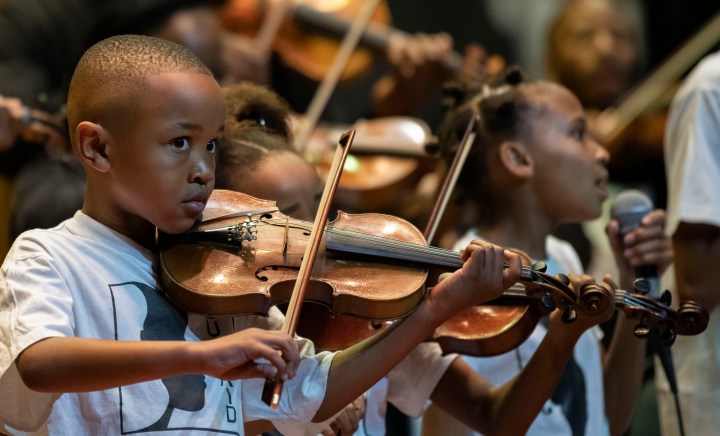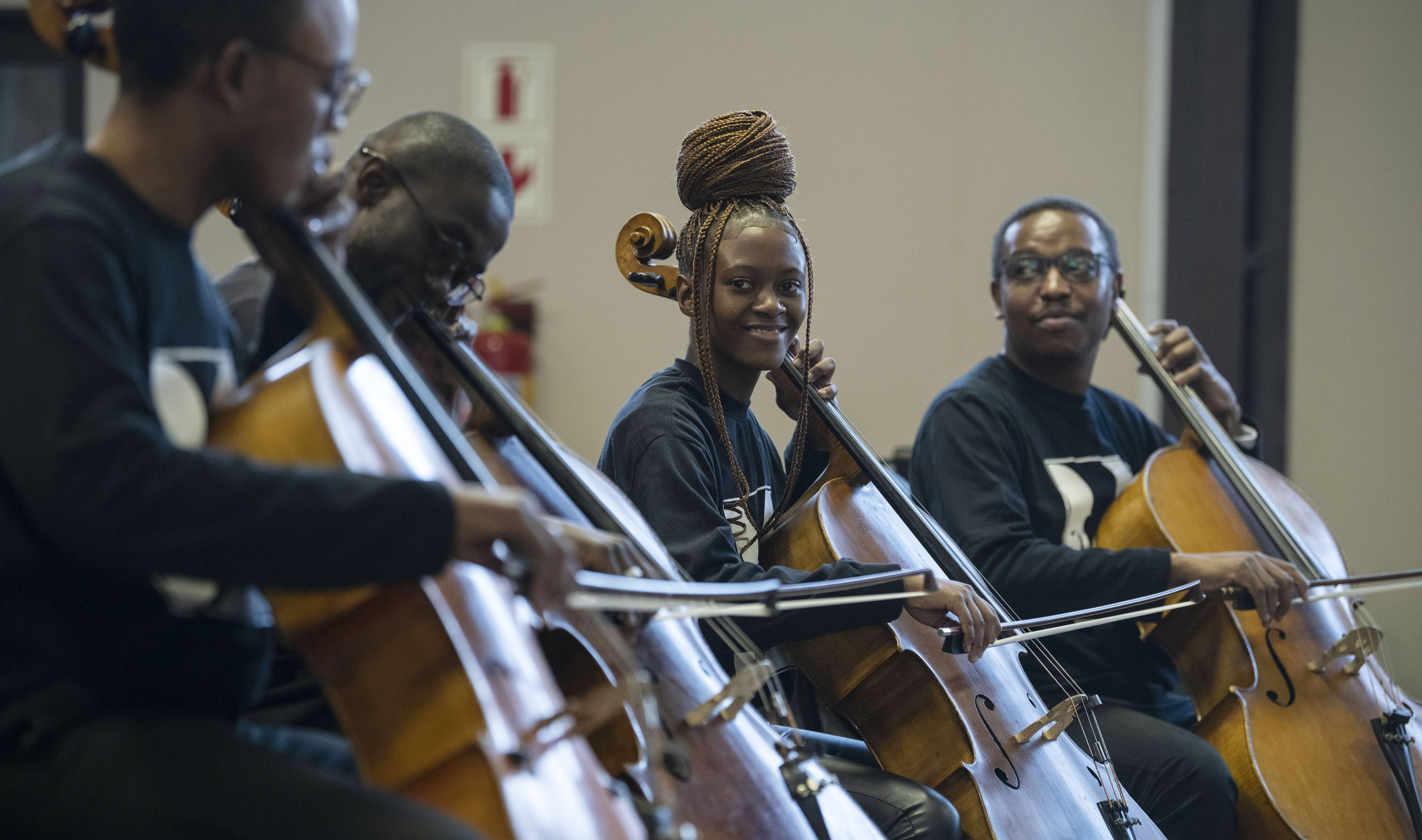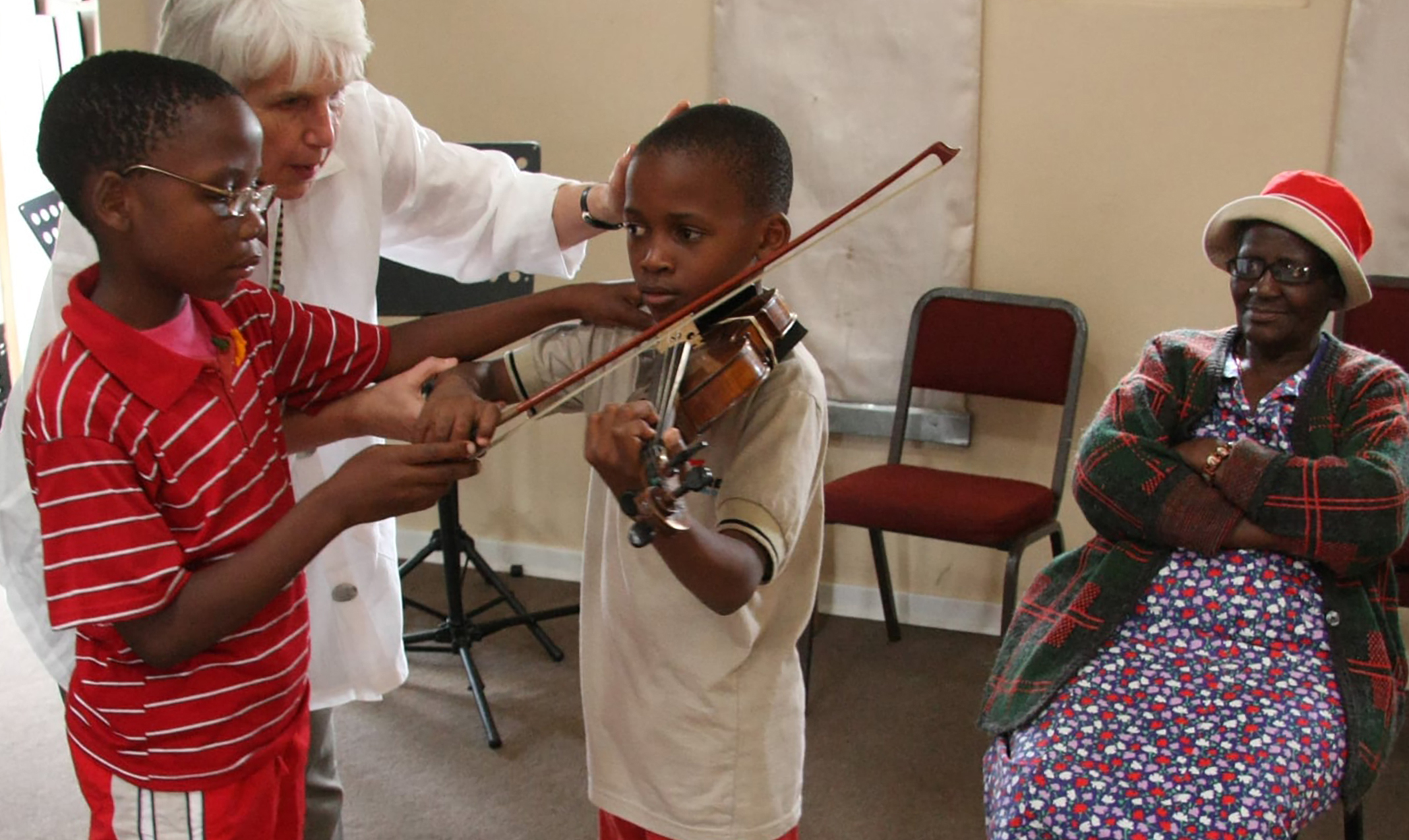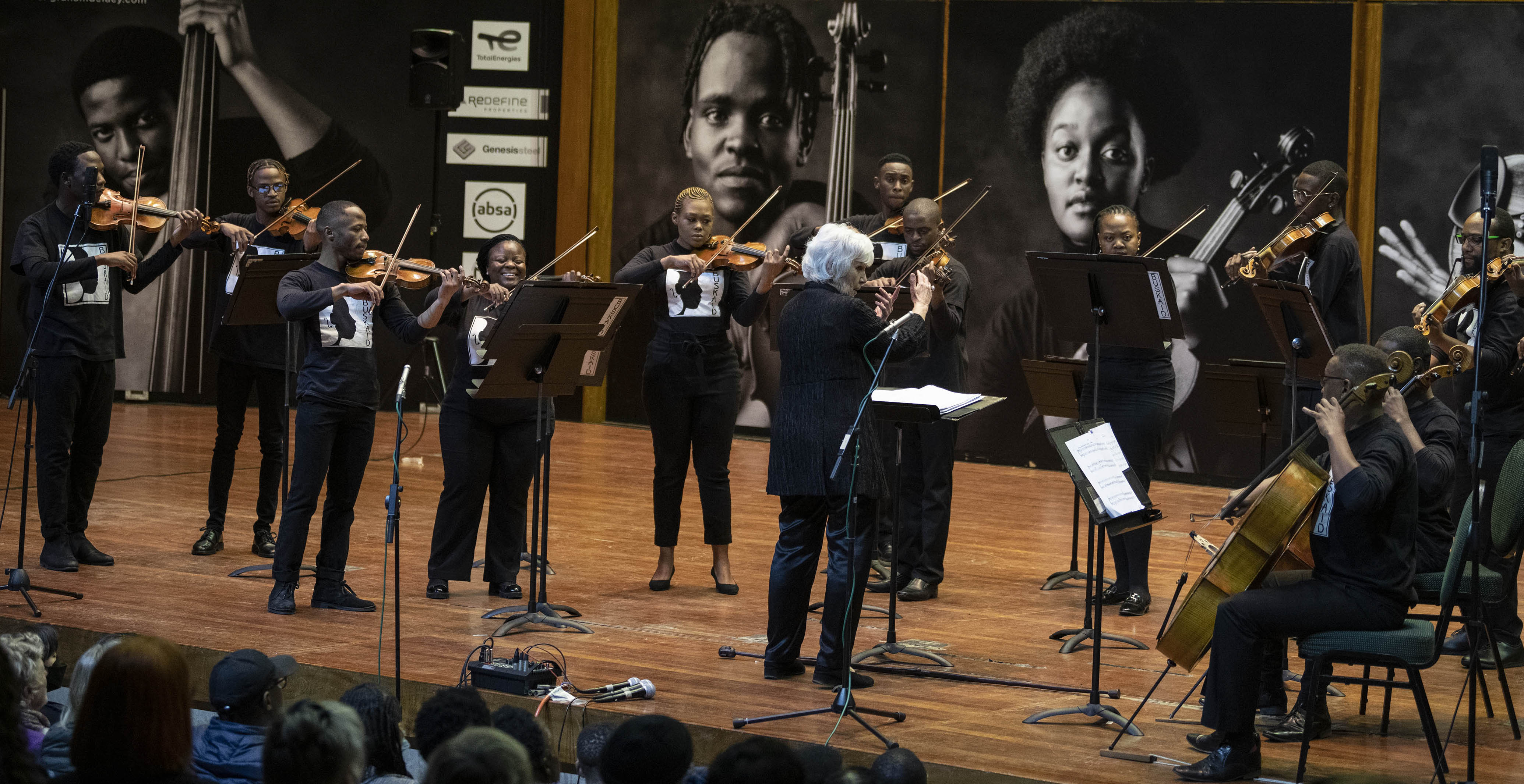NOTES OF INSPIRATION
Forging a romance with music in a furnace full of love and pain in Soweto

Soweto music school lifts children from despair to soaring performances. It has not been an easy journey, but 25 years later the Buskaid Music School in Diepkloof is still there, full of life and love, nurturing often prodigious talent.
Rosemary Nalden remembers the first time she met Mzwandile Twala.
“The memory is etched in my brain,” says Nalden. It was 19 years ago and Nalden, the founder of Buskaid, was conducting a rehearsal with a group of musicians at the Buskaid Music School in Diepkloof, Soweto. As the musicians were playing, Nalden caught sight of a three-year-old boy, beautifully dressed, with a huge pair of glasses magnifying his inquisitive eyes, standing alone in the doorway.
“Who does he belong to?” asked Nalden, thinking one of the musicians had brought a little brother to the rehearsal.
“He’s mine,” came the reply from an elderly woman. The woman was Mzwandile’s foster grandmother and she had brought the boy to the music school after seeing a report about Buskaid on TV.
“I saw you on television and I want my grandson to learn the violin,” the granny told Nalden. Today, 19 years later, the music school celebrates its 25th anniversary and Twala, now 22, has developed into a prodigiously talented violin player, just as his foster granny hoped for all those years ago. However, the journey to this point for both Twala and the Buskaid organisation has been anything but easy.

Koketso Mphela plays the cello during a Buskaid performance at a church in Diepkloof, Soweto. (Photo: Ihsaan Haffejee)
Born in England, Nalden moved with her family to New Zealand, where her father was a professor of music at Auckland University.
“I grew up in a musical family. For as long as I can remember growing up, music was everything and everywhere,” says Nalden.
Later in life Nalden earned a place at the Royal College of Music in London, where she became a proficient viola player.
After graduating, she embarked on a successful music career that led to her playing in ensembles and orchestras around the world. In November 1991 she found herself at her London home listening to the BBC’s Radio 4, which reported from Soweto about a music project that was teaching township children to play strings but was struggling to secure funding.
A few months later Nalden found another story about the project, in The Independent.
“It was completely by chance that I heard the broadcast and then bought the newspaper and saw the same story and thought, you know, this is a bit odd. I think this story is sort of chasing me,” says Nalden.
Read more in Daily Maverick: “Hope and play: Music centre hits the right notes for Soweto youngsters”
Drawing on her networks in the music world, Nalden convinced 120 of her colleagues to take part in a large-scale music project in which musicians busked at 16 railway stations to raise money for the Soweto music project.
Nalden first travelled to South Africa in 1992, when apartheid was dying and democracy was struggling to be born. Soweto, where she intended to help children with music lessons, was in the grip of violent confrontations between the ANC and the IFP, fuelled by the apartheid government.
“When I first arrived I stayed with some activists. I got a real taste of it – I mean, it was sort of dramatic. It was almost like walking on to a movie set,” she said of her first experiences of Soweto.
She returned to Soweto in subsequent years to help with the music project, travelling to and from England, where she was still working as a musician.
The original music project Nalden had been fundraising for fizzled out, but by that time she had been captivated by the energy of the township.
“You know, in Soweto there’s always this sort of vibrancy and life and laughing and excitement. It’s very magnetic. It’s hypnotic, almost,” she says.
And so Nalden returned again in 1997 to set up her own music school with the help of friends. She originally intended to stay for a little while just to help to set up the school, but 25 years later Nalden can still be found in Diepkloof, full of life and love, and passing on her passion for music to the children she teaches.
In 1998, a piece of land was acquired in Diepkloof and a bigger school was built and it was there, years later, that three-year-old Mzwandile Twala found himself standing in a doorway watching Nalden conduct a class.
Twala doesn’t have a memory of that day and doesn’t even know why he chose the violin, although he assumes it’s because it was the smallest instrument and it would accommodate his tiny hands.
His earliest memory involves him, around the age of five or six, playing in Buskaid’s annual concert – the same as the one recently held in celebration of its 25th anniversary.

Some of the younger music students share a laugh before the start of a performance at a church in Diepkloof, Soweto. (Photo: Ihsaan Haffejee)
“He was so much younger than anybody else. He was a nuisance, you know: he couldn’t concentrate, wouldn’t sit still,” says Nalden of Twala, who was starting his musical journey under the tutelage of music teacher Keabetswe Goodman.
However, after a while Nalden noticed “there was something special going on” with this kid. “He was just prodigious, really, and continued developing by showing great dedication and focus.”
Many questions, no answers
Away from the music school, Twala was being raised in a tiny home in Rockville by his foster grandmother. He says: “You know, she was not financially well off; she was just getting government grants. So Rosemary also really helped and made sure I had everything I needed at home and at school.”
As he got older Twala was coming to grips with the realisation that growing up without knowing his parents left him feeling “different” from other kids. By the time he entered adolescence that trickle of unresolved emotion had turned into a downpour.
“I was very emotional growing up. It was a difficult time, I had so many questions but not many answers. In my teenage years it just got worse. I was actually boiling up because of the questions I had inside me.
“‘Where’s my mom? Why am I alone?’ and all that stuff,” says Twala.

Mzwandile Twala (left), then nine, is shown by Rosemary Nalden how to teach as his foster grandmother watches. (Photo: Pierre du Toit / Buskaid)
He describes his emotions as an “overwhelming sadness” that urgently needed an outlet. That release came in the form of his music. Twala channelled all his feelings into the strings of his violin. “The only way I could express myself was through music. Channelling my emotions into my playing, I think people could hear my feelings through my music,” he says.
Read more in Daily Maverick: “The name of the game is tennis for a group of youngsters in rural Limpopo”
Growing up in difficult conditions while dealing with the unresolved trauma of being parentless and trying to withstand unhealthy peer pressure, Twala seemed to have slim chances of success. But Buskaid provided him not only with a place to learn music, but also safety and community, which helped him to cope with his emotions.
Despite the challenges he faced growing up, Twala expresses gratitude for the way his life has played out so far.
“I’m actually grateful for how things happened, the good and the bad. Because I wouldn’t have been to Buskaid; I wouldn’t have met Rosemary and had the chance to become a musician,” he says.
Something special… again
The development of the children at Buskaid is something Nalden likens to planting a small seed and watching it grow into a beautiful tree. Another small seed was planted a few years ago as Nalden was conducting a performance of Buskaid musicians at a church in Soweto.
A tiny three-year-old boy strolled into the church, sat down in the front row and stared intently at the playing musicians, entranced. Afterwards, he approached Nalden and said he wanted to learn the violin.
That boy is Khumoetsile Legoale and even though he is at the beginning of his musical journey he has already performed in front of hundreds of people, at Buskaid’s 25th anniversary concert last weekend.

Mzwandile Twala performs at the Linder Auditorium in Buskaid’s 25th anniversary concert. (Photo: Ihsaan Haffejee)
And just as she noticed “something special” in the young Twala all those years ago, Nalden senses that same specialness in young Khumoetsile.
And how does he feel when he’s playing the violin? Khumoetsile, now eight, answers with the simplicity of a seasoned philosopher: “It makes me really happy.”
For Nalden, her staff, students, musicians and the Buskaid organisation, the journey of the past 25 years has not been straightforward. Last weekend during the 25th anniversary concert, at a packed Linder Auditorium, she told the audience a story that encapsulated Buskaid’s history, going back 25 years earlier to the same auditorium, where Buskaid held its first anniversary concert.
Among the Buskaid musicians playing that day were two prodigious talents, Samson Diamond and Gift Moloisane, who were 12 and 14 years old. Diamond has gone on to establish himself as a world-class violinist and is now a lecturer at the University of the Free State, the leader of the award-winning Odeion String Quartet and concertmaster of the Free State Symphony Orchestra.
Read more in Daily Maverick: “An inherited struggle for dance”
Moloisane developed a drug habit. Although he successfully rehabilitated himself, later in life he was found dead at his home in Soweto. Between the contrasting stories of these two men lies the tale of the highs and lows of running Buskaid over the past 25 years, said Nalden.
Love and pain
After Nalden’s speech, Twala performed a solo violin piece, Romance in F minor by the Czech composer Antonín Dvořák. Twala had done some research on Dvořák and found that by the time the composer wrote Romance in F minor in 1877 he had already lost three of his young children. This profound sense of loss and sadness was something that Twala says he could relate to.

The Buskaid Soweto String Ensemble, conducted by Rosemary Nalden, on stage at the Linder Auditorium during Buskaid’s 25th anniversary concert. (Photo: Ihsaan Haffejee)
So, on a late winter’s afternoon in Johannesburg, the music written by a gifted Czech was played by a gifted young man from Soweto, who forged his musical style in a furnace filled with love and pain.
He overwhelmed the auditorium with the sound of his soul and when he played the final note he received an extended standing ovation from those lucky enough to be there.
When Twala looks to the future he sees himself furthering his musical education. He obtained a scholarship to study at the Royal Academy of Music in London but the Covid-19 pandemic and the subsequent travel restrictions put a stop to his plans.
But when he looks to the past he can make a confident assessment of his journey so far.
“Music definitely saved me. It saved me from myself,” says Twala. DM168
Haffejee is a writer and photojournalist.
This story first appeared in our weekly Daily Maverick 168 newspaper, which is available countrywide for R25.

















 Become an Insider
Become an Insider
Comments - Please login in order to comment.